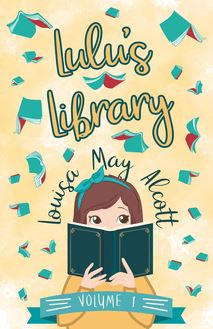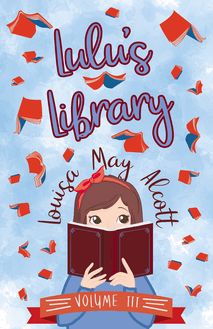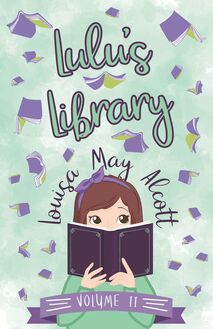-
 Univers
Univers
-
 Ebooks
Ebooks
-
 Livres audio
Livres audio
-
 Presse
Presse
-
 Podcasts
Podcasts
-
 BD
BD
-
 Documents
Documents
-
- Cours
- Révisions
- Ressources pédagogiques
- Sciences de l’éducation
- Manuels scolaires
- Langues
- Travaux de classe
- Annales de BEP
- Etudes supérieures
- Maternelle et primaire
- Fiches de lecture
- Orientation scolaire
- Méthodologie
- Corrigés de devoir
- Annales d’examens et concours
- Annales du bac
- Annales du brevet
- Rapports de stage
La lecture à portée de main
Vous pourrez modifier la taille du texte de cet ouvrage
Découvre YouScribe en t'inscrivant gratuitement
Je m'inscrisDécouvre YouScribe en t'inscrivant gratuitement
Je m'inscrisEn savoir plus
Vous pourrez modifier la taille du texte de cet ouvrage
En savoir plus

Description
Sujets
Informations
| Publié par | Read Books Ltd. |
| Date de parution | 11 octobre 2019 |
| Nombre de lectures | 1 |
| EAN13 | 9781528788441 |
| Langue | English |
| Poids de l'ouvrage | 3 Mo |
Informations légales : prix de location à la page 0,0500€. Cette information est donnée uniquement à titre indicatif conformément à la législation en vigueur.
Extrait
LULU'S LIBRARY
VOLUME I
By
LOUISA MAY ALCOTT
First published in 1886
This edition published by Read Books Ltd. Copyright © 2019 Read Books Ltd. This book is copyright and may not be
reproduced or copied in any way without
the express permission of the publisher in writing
British Library Cataloguing-in-Publication Data
A catalogue record for this book is available from the British Library
Contents
Louisa M ay Alcott
A CHRISTMAS DREAM, AND HOW IT C AME TRUE.
THE CANDY COUNTRY.
NAUGH TY JOCKO.
THE SKIPPI NG SHOES.
COCKYLOO.
ROSY'S JOURNEY.
HOW THEY RAN AWAY.
THE F AIRY BOX.
A HOLE IN THE WALL.
PART I.
PART II.
PART III.
THE PI GGY GIRL.
THE THR EE FROGS.
B AA! BAA!
BAA THE FIRST.
BAA THE SECOND.
Louisa May Alcott
Louisa May Alcott was an American Novelist, best known for the classic Little Women (1868) and its sequels Little Men and Jo’s Boys. Alcott was born on 29 November, 1832 in Germantown, Pennsylvania, USA, and was raised by her transcendentalist parents. The family, despite their connections with the American intellectual elite, suffered severe financial hardship and Alcott frequently helped to support the household. In 1840, after several financial setbacks, most notably following the experimental school set up by Louisa May’s father, the family moved to a cottage along the Sudbury River in Massachusetts. In 1843, the family moved again to the Utopian Fruitlands Community , an agrarian commune, dedicated to natural living. They finally settled in a house they named Hillside in 1845. As a result of this peripatetic childhood, Alcott’s schooling was mainly received from her father, who was an incredibly strict disciplinarian, high thinker and advocate of plain living. This instilled a determination and strong work ethic in Alcott, who worked as a teacher, governess, seamstress and writer in her early years. As an adult, Alcott was a strong abolitionist and a feminist advocate, becoming the first woman to register to vote in Concord, in a school board election. During the civil war, Alcott worked as a nurse in the Union Hospital at Georgetown, D.C. She collected all her letters, often dryly humorous, in book entitled Hospital Sketches (1863); a work which brought Alcott critical acclaim. Following on from this success, Alcott wrote several novels under the pen name A. L. Barnard, most notably A Long Fatal Love Chase (1866) and A Modern Mephistopheles (1875). However, Little Women and its sequels were Alcott’s major successes; the first book dealt with the childhood of Meg, Jo, Beth and Amy; characters strongly based on Alcott’s childhood accompanied by her own three sisters. The sequel, Good Wives (1869) dealt with their progression into adulthood, whilst Little Men (1871) detailed Jo’s life at the school she founded alongside her husband. Jo’s Boys (1886) completed the ‘Family Saga’. The Character Jo was loosely based on Alcott’s own life, however unlike the heroine, Alcott never married, commenting that ‘I am more than half-persuaded that I am a man's soul put by some freak of nature into a woman's body ... because I have fallen in love with so many pretty girls and never once the least bit with any man.’ Alcott was firmly part of the Gilded Age , along with authors such as Elizabeth Stoddard and Rebecca Harding Davis, she addressed women’s issues in a modern and candid manner. Alcott continued to write until her death on 6 March, 1888. The cause of death is uncertain; she suffered chronic health problems, including vertigo and typhoid, the latter of which was treated with mercury. However recent analysis of her illnesses has suggested an autoimmune disease such as Lupus. She is buried in Sleepy Hollow Cemetery, Concord, Massachusetts, on a hillside known as Author ’s Ridge.
PREFACE.
All but three of these stories were told to my little niece during our quiet hour before bedtime. They became such favorites with her and her friends that I wrote them down in several small blue books, and called them LULU'S LIBRARY. Having nothing else to offer this year, I have collected them in one volume as a Christmas gift to my boys and girls from their o ld friend
AUNT JO. CONCORD, Augu st, 1885.
She actually stood in "a grove of Chris tmas trees."
CHAPTER I.
A CHRISTMAS DREAM, AND HOW IT CAME TRUE.
"I'm so tired of Christmas I wish there never would be another one!" exclaimed a discontented-looking little girl, as she sat idly watching her mother arrange a pile of gifts two days before they were to be given.
"Why, Effie, what a dreadful thing to say! You are as bad as old Scrooge; and I 'm afraid something will happen to you, as it did to him, if you don't care for dear Christmas," answered mamma, almost dropping the silver horn she was filling with delicious candies.
"Who was Scrooge? What happened to him?" asked Effie, with a glimmer of interest in her listless face, as she picked out the sourest lemon-drop she could find; for nothing sweet suited her j ust then.
"He was one of Dickens's best people, and you can read the charming story some day. He hated Christmas until a strange dream showed him how dear and beautiful it was, and made a better man of him."
"I shall read it; for I like dreams, and have a great many curious ones myself. But they don't keep me from being tired of Christmas," said Effie, poking discontentedly among the sweeties for something wort h eating.
"Why are you tired of what should be the happiest time of all the year?" asked mamma, a nxiously.
"Perhaps I should n't be if I had something new. But it is always the same, and there is n't any more surprise about it. I always find heaps of goodies in my stocking. Don't like some of them, and soon get tired of those I do like. We always have a great dinner, and I eat too much, and feel ill next day. Then there is a Christmas tree somewhere, with a doll on top, or a stupid old Santa Claus, and children dancing and screaming over bonbons and toys that break, and shiny things that are of no use. Really, mamma, I 've had so many Christmases all alike that I don't think I can bear another one." And Effie laid herself flat on the sofa, as if the mere idea was too much for her.
Her mother laughed at her despair, but was sorry to see her little girl so discontented, when she had everything to make her happy, and had known but ten Christ mas days.
"Suppose we don't give you any presents at all,--how would that suit you?" asked mamma, anxious to please her spoil ed child.
"I should like one large and splendid one, and one dear little one, to remember some very nice person by," said Effie, who was a fanciful little body, full of odd whims and notions, which her friends loved to gratify, regardless of time, trouble, or money; for she was the last of three little girls, and very dear to all th e family.
"Well, my darling, I will see what I can do to please you, and not say a word until all is ready. If I could only get a new idea to start with!" And mamma went on tying up her pretty bundles with a thoughtful face, while Effie strolled to the window to watch the rain that kept her in-doors and made he r dismal.
"Seems to me poor children have better times than rich ones. I can't go out, and there is a girl about my age splashing along, without any maid to fuss about rubbers and cloaks and umbrellas and colds. I wish I was a begg ar-girl."
"Would you like to be hungry, cold, and ragged, to beg all day, and sleep on an ash-heap at night?" asked mamma, wondering what would c ome next.
"Cinderella did, and had a nice time in the end. This girl out here has a basket of scraps on her arm, and a big old shawl all round her, and does n't seem to care a bit, though the water runs out of the toes of her boots. She goes paddling along, laughing at the rain, and eating a cold potato as if it tasted nicer than the chicken and ice-cream I had for dinner. Yes, I do think poor children are happier than ri ch ones."
"So do I, sometimes. At the Orphan Asylum to-day I saw two dozen merry little souls who have no parents, no home, and no hope of Christmas beyond a stick of candy or a cake. I wish you had been there to see how happy they were, playing with the old toys some richer children had se nt them."
"You may give them all mine; I 'm so tired of them I never want to see them again," said Effie, turning from the window to the pretty baby-house full of everything a child's heart coul d desire.
"I will, and let you begin again with something you will not tire of, if I can only find it." And mamma knit her brows trying to discover some grand surprise for this child who did n't care for C hristmas.
Nothing more was said then; and wandering off to the library, Effie found "A Christmas Carol," and curling herself up in the sofa corner, it all before tea. Some of it she did not understand; but she laughed and cried over many parts of the charming story, and felt better without kno wing why.
All the evening she thought of poor Tiny Tim, Mrs. Cratchit with the pudding, and the stout old gentleman who danced so gayly that "his legs twinkled in the air." Presently bed-time arrived.
"Come, now, and toast your feet," said Effie's nurse, "while I do your pretty hair and tell stories."
"I 'll have a fairy tale to-night, a very interesting one," commanded Effie, as she put on her blue silk wrapper and little fur-lined slippers to sit before the fire and have her long curls brushed.
So Nursey told her best tales; and when at last the child lay down under her lace curtains, her head was full of a curious jumble of Christmas elves, poor children, snow-storms, sugar-plums, and surprises. So it is no wonder that she dreamed all night; and this was the dream, which she never quit e forgot.
S
-
 Univers
Univers
-
 Ebooks
Ebooks
-
 Livres audio
Livres audio
-
 Presse
Presse
-
 Podcasts
Podcasts
-
 BD
BD
-
 Documents
Documents
-
Jeunesse
-
Littérature
-
Ressources professionnelles
-
Santé et bien-être
-
Savoirs
-
Education
-
Loisirs et hobbies
-
Art, musique et cinéma
-
Actualité et débat de société
-
Jeunesse
-
Littérature
-
Ressources professionnelles
-
Santé et bien-être
-
Savoirs
-
Education
-
Loisirs et hobbies
-
Art, musique et cinéma
-
Actualité et débat de société
-
Actualités
-
Lifestyle
-
Presse jeunesse
-
Presse professionnelle
-
Pratique
-
Presse sportive
-
Presse internationale
-
Culture & Médias
-
Action et Aventures
-
Science-fiction et Fantasy
-
Société
-
Jeunesse
-
Littérature
-
Ressources professionnelles
-
Santé et bien-être
-
Savoirs
-
Education
-
Loisirs et hobbies
-
Art, musique et cinéma
-
Actualité et débat de société
- Cours
- Révisions
- Ressources pédagogiques
- Sciences de l’éducation
- Manuels scolaires
- Langues
- Travaux de classe
- Annales de BEP
- Etudes supérieures
- Maternelle et primaire
- Fiches de lecture
- Orientation scolaire
- Méthodologie
- Corrigés de devoir
- Annales d’examens et concours
- Annales du bac
- Annales du brevet
- Rapports de stage








